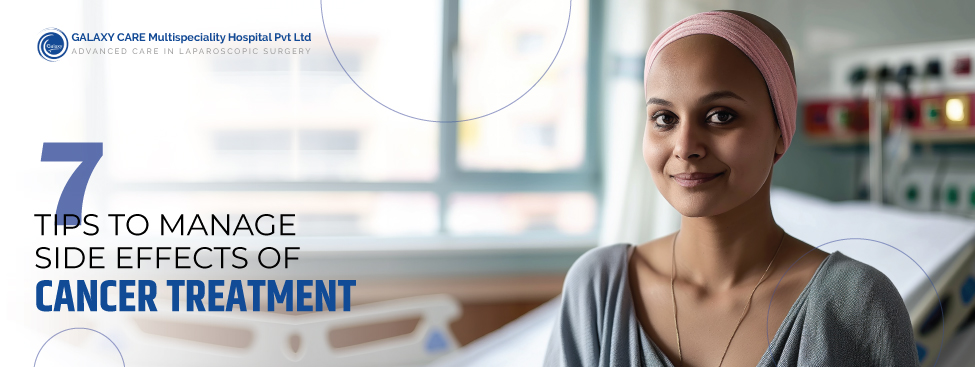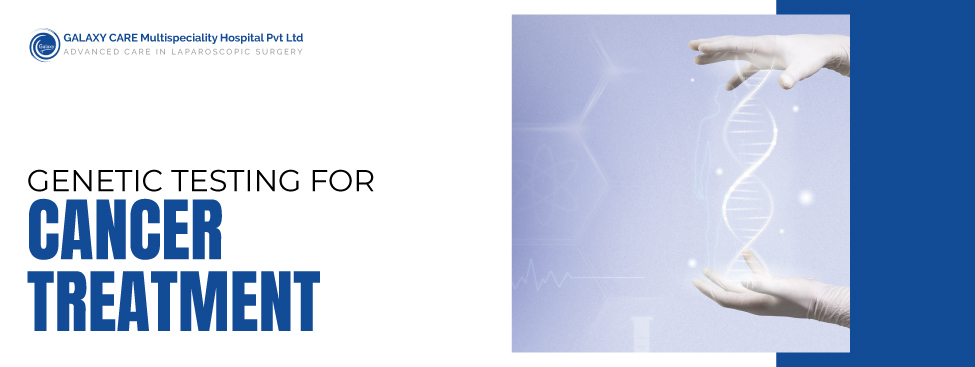
7 Tips to Manage Side Effects of Cancer Treatment
Cancer treatment can be really tough, both physically and emotionally. While fighting cancer is the main goal, the side effects of treatment can also be difficult and affect a patient’s quality of life. At Galaxy Care Hospital, we understand how important it is to manage these side effects to help patients feel better throughout their treatment.
Treatments like chemotherapy, radiation, and targeted therapies can cause many side effects, such as feeling tired, nausea, hair loss, skin problems, and difficulty thinking clearly. These side effects can be upsetting, but with the right help and support, they can be managed well. Our Best Cancer Specialists in Pune, nurses, and other experts are here to provide care and guidance to help patients deal with these challenges. Let us help you navigate the top 7 tips to manage the side effects of cancer treatment. Let’s get started!
Tip 1: Stay Hydrated and Nourished
Staying well-hydrated and nourished is essential during cancer treatment. Treatments like chemotherapy and radiation often bring side effects such as nausea, changes in taste, and loss of appetite, which can make eating and drinking challenging. Combat these issues by eating small, nutrient-dense meals throughout the day that are easier to digest. Hydration is equally important, so aim to drink plenty of water, and consider broths or electrolyte beverages for added nourishment. These adjustments can help you feel stronger and better supported during treatment, ensuring your body receives the nutrients it needs. Consult your Oncologist in Pune for personalized food recommendations.
Tip 2: Prioritize Rest and Sleep
Cancer treatments can lead to significant fatigue, making it vital to prioritize rest and maintain a consistent sleep schedule. Fatigue is a common side effect, so it’s important to listen to your body and allow yourself to rest whenever needed. Try to set up a calming sleep environment by minimizing noise and keeping your room cool and dark. Gentle exercise, like walking or yoga, can also help manage fatigue and improve sleep quality. By balancing rest and light activity, you can support your body’s recovery and enhance your overall well-being.
Tip 3: Manage Nausea and Vomiting
Nausea and vomiting are challenging side effects of some cancer treatments. To manage these symptoms, work closely with your healthcare team to explore anti-nausea medications or complementary therapies, like ginger supplements or acupuncture. Opt for small, frequent meals and avoid strong-smelling foods that may trigger nausea. Staying hydrated is also crucial, as it helps to manage symptoms and maintain your energy. Taking these steps can make a big difference in easing the discomfort of nausea, helping you stay focused on your recovery journey.
Tip 4: Care for Your Skin and Hair
Radiation therapy and certain chemotherapy drugs can affect skin and hair, causing dryness, irritation, or hair loss. To protect your skin, choose gentle, fragrance-free skincare products, and avoid excessive sun exposure. If hair loss occurs, you might find comfort in wearing a wig or scarf. Be gentle with your hair, washing it with mild products and avoiding harsh styling techniques. This approach can help you maintain skin and hair health, giving you confidence and comfort during your treatment.
Tip 5: Engage in Physical Activity
Despite the challenges of cancer treatment, physical activity can positively impact side effects such as fatigue, mood changes, and muscle weakness. Consult your healthcare team to create a safe and suitable exercise routine that aligns with your abilities. Even light activities, like walking or chair exercises, can help maintain strength, improve mood, and reduce fatigue. Engaging in regular, gentle activity not only boosts physical health but also supports mental well-being, making it easier to cope with treatment.
Tip 6: Seek Emotional Support
Cancer treatment can bring emotional challenges, so prioritizing mental health is essential. Reach out to family, friends, or mental health professionals to share your feelings and gain emotional support. Joining a support group can provide a sense of community and connection with others who understand your experiences, allowing you to share coping strategies and feel less alone. These emotional resources can be invaluable in helping you navigate the emotional ups and downs of treatment.
Tip 7: Explore Complementary Therapies
Alongside conventional treatments, many patients benefit from complementary therapies like meditation, yoga, massage, and acupuncture. These therapies can help reduce stress, ease anxiety, and manage pain, promoting an overall sense of well-being. Before incorporating any new therapy, consult with your healthcare team to ensure it’s safe and suitable for your treatment plan. Complementary therapies can offer holistic support, helping you feel more balanced and comfortable during your cancer journey.
Choose The Best Cancer Hospital in Pune
At Galaxy Care Hospital, the best cancer hospital in Pune, we are committed to providing comprehensive and compassionate care to our patients. Our state-of-the-art facilities, advanced treatment options, including laparoscopic surgery and chemotherapy, and dedicated team of cancer specialists in Pune work tirelessly to ensure our patients receive the highest quality care.
If you or a loved one is undergoing cancer treatment, we encourage you to book a consultation with our oncologists in Pune. Our team will guide you through the treatment process, providing personalized care and support to manage side effects and maintain your overall well-being. Together, we can overcome cancer with strength, resilience, and hope!


